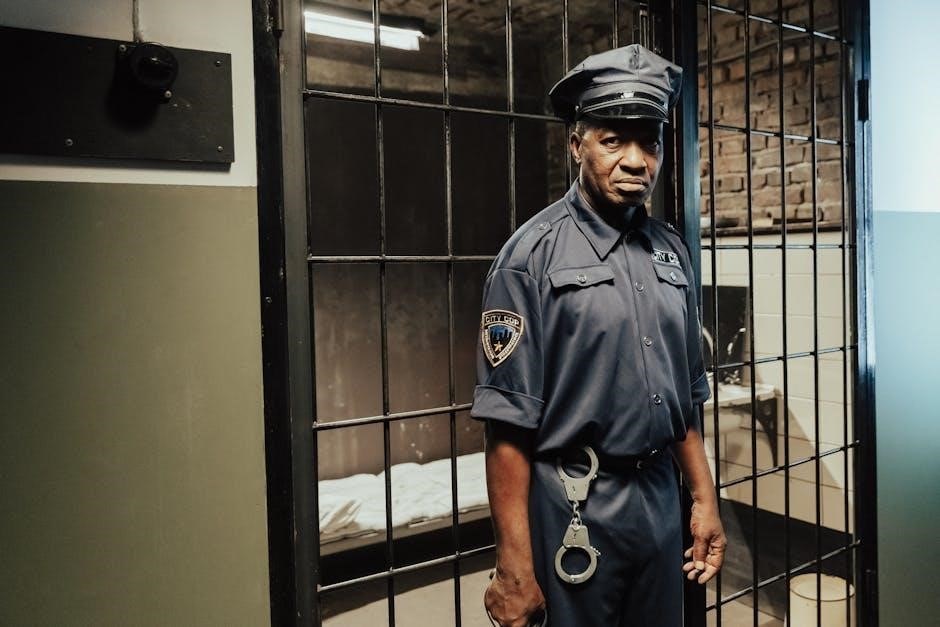Security guards play a crucial role in maintaining safety and security. Their duties include patrolling, monitoring, and ensuring emergency procedures are followed to protect people and assets effectively.
1.1 Overview of the Role of Security Guards
Security guards are responsible for safeguarding premises, personnel, and assets by patrolling, monitoring surveillance, inspecting buildings, and controlling access. They ensure safety, respond to emergencies, and maintain order. Their role includes preventing theft, vandalism, and unauthorized entry, while adhering to protocols and procedures to create a secure environment.
1.2 Importance of Understanding Security Guard Responsibilities
Understanding security guard responsibilities is essential for ensuring safety, preventing crimes, and maintaining order. It enables effective patrolling, monitoring, and emergency response while fostering teamwork and compliance with laws. Clear responsibilities ensure guards act ethically, respect human rights, and provide reliable protection, making their role vital for secure environments and organizational success.
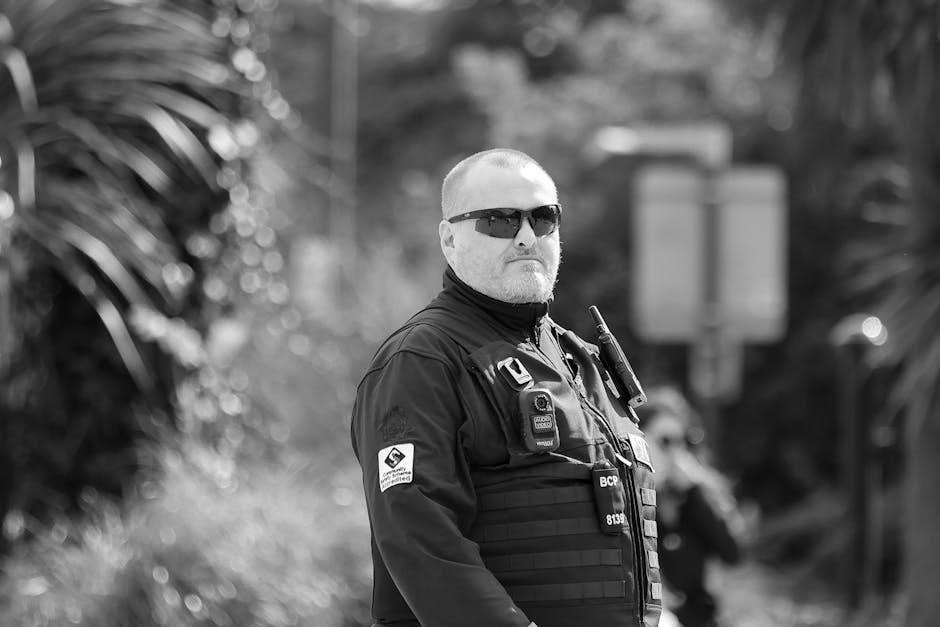
Essential Duties and Responsibilities
Security guards patrol premises, monitor equipment, inspect buildings, manage access, and ensure safety. Their role involves protecting property, preventing theft, and responding to emergencies effectively.
2.1 Patrolling Premises
Security guards regularly patrol premises, including interior and exterior areas, to identify safety hazards, suspicious activities, or unauthorized access. This ensures a secure environment, prevents theft, and maintains order while documenting findings for further action.
2.2 Monitoring Surveillance Equipment
Security guards monitor CCTV cameras and alarms to detect suspicious activities or breaches. They respond promptly to alerts, ensuring incidents are addressed efficiently. This duty involves maintaining equipment functionality and coordinating with response teams to uphold premises security and safety standards effectively.
2.3 Inspecting Buildings and Equipment
Security guards conduct regular inspections of buildings and equipment to identify safety and security risks. They check for fire hazards, unauthorized access points, and malfunctioning systems, ensuring all areas are secure and functional. This proactive approach helps prevent incidents and maintains a safe environment for occupants and assets.
2.4 Authorizing Entry and Exit
Security guards monitor and control access points, ensuring only authorized individuals enter or exit premises. They verify identities, check credentials, and use equipment like barriers or scanners. Guards maintain entry/exit logs and enforce access policies to safeguard property, personnel, and assets from unauthorized access or potential threats.
2.5 Ensuring Safety and Emergency Procedures
Security guards ensure premises safety by responding to emergencies, conducting drills, and inspecting fire and safety equipment. They coordinate evacuations, provide first aid, and identify potential hazards to prevent incidents.
Their role includes monitoring emergency systems, reporting safety violations, and collaborating with emergency services to minimize risks and ensure compliance with safety protocols.
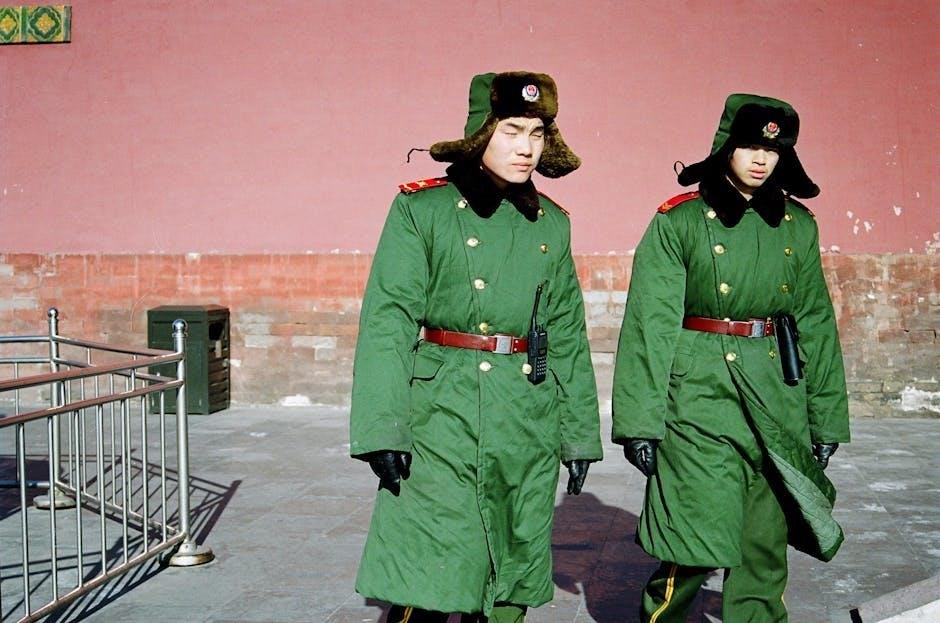
Prevention, Visibility, and Vigilance
Security guards prevent crimes through visible presence and vigilance, deterring potential threats and maintaining a secure environment by being observant and proactive in their duties.
3.1 Crime Prevention and Deterrence
Security guards deter criminal activity by maintaining visible presence, monitoring suspicious behavior, and engaging with individuals to prevent potential threats. Proactive measures include patrolling, surveillance, and enforcing security protocols to safeguard premises and assets effectively.
3.2 Maintaining a Visible Presence
Security guards maintain a visible presence to deter potential threats. Uniforms, regular patrols, and strategic positioning ensure a strong, noticeable security posture. This visible deterrent discourages illegal activities and provides a sense of safety for employees, visitors, and property, fostering a secure environment.
3.3 Staying Alert and Observant
Security guards must remain vigilant, constantly monitoring surroundings for suspicious activities. They observe behavior, detect potential threats, and act swiftly to prevent incidents. Effective use of surveillance equipment and keen awareness ensure safety, enabling timely responses to maintain security and order in protected areas.
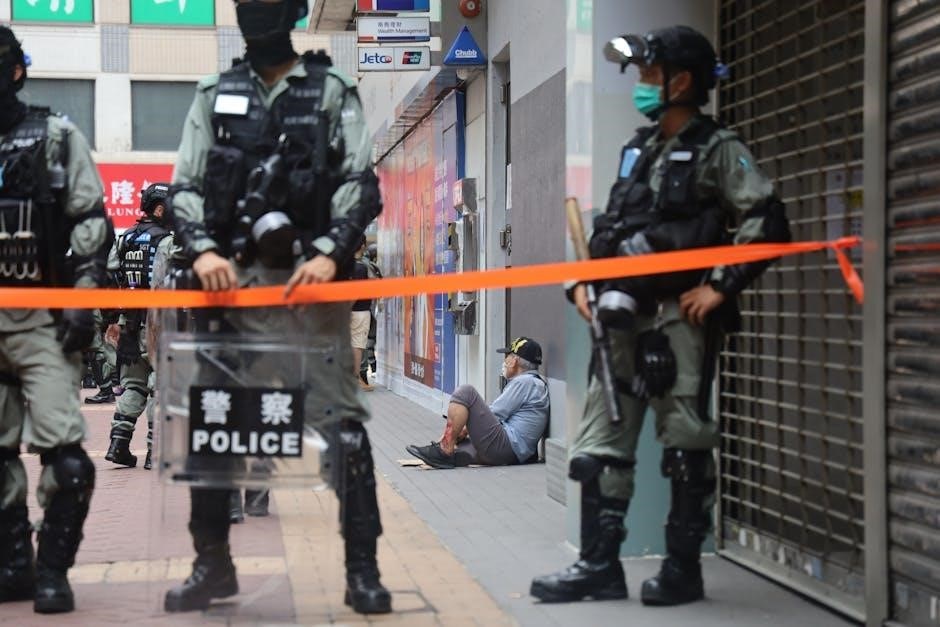
Monitoring and Access Control
Security guards monitor access points, screen individuals and vehicles, enforce entry/exit protocols, and ensure compliance with security regulations to maintain premises safety and control unauthorized access effectively.
4.1 Screening Individuals and Vehicles
Security guards are responsible for screening individuals and vehicles entering the premises. This includes verifying identities, checking for authorized access, and inspecting vehicles to prevent unauthorized or dangerous items from entering the facility, ensuring the safety and security of the property and its occupants at all times effectively.
4.2 Managing Access Points
Managing access points involves controlling and monitoring entry and exit points to ensure only authorized personnel can enter. Guards must enforce access protocols, verify credentials, and maintain logs of all entries and exits to uphold security standards and prevent unauthorized access effectively at all times.
4.4 Enforcing Security Protocols
Enforcing security protocols requires guards to ensure all safety measures are followed. This includes verifying identities, screening individuals and vehicles, and adhering to established procedures. Guards must consistently uphold policies to maintain a secure environment, responding promptly to violations and ensuring compliance with organizational security standards at all times effectively.

Emergency Response and Incident Handling
Security guards must effectively respond to emergencies, coordinate with services, and provide aid during incidents to ensure safety and minimize risks efficiently.
5.1 Responding to Alarms and Incidents
Security guards must swiftly respond to alarms and incidents, ensuring immediate action to secure the area, communicate with emergency services, and provide initial assistance to maintain safety and order.
5.2 Coordinating with Emergency Services
Security guards coordinate with emergency services during incidents, ensuring timely communication and guidance for responders. They provide critical information, secure access points, and help maintain a safe environment for effective emergency response and resolution.
5.3 Providing First Aid and Assistance
Security guards often provide immediate first aid and assistance during medical emergencies. They stabilize situations, administer basic care, and ensure the injured receive prompt attention. Guards also maintain incident records, ensuring proper documentation for further medical or legal actions.
Reporting and Documentation
Reporting and documentation are critical tasks for security guards. They maintain detailed records of incidents, patrols, and inspections, ensuring accurate and timely documentation for legal and operational purposes.
6.1 Writing Incident Reports
Security guards must accurately document incidents, including dates, times, locations, and details of events. Reports should include witness statements and actions taken, ensuring clarity and completeness for legal and operational purposes.
6.2 Maintaining Security Logs
Maintaining detailed security logs is essential for tracking daily activities, patrols, and incidents. Logs should record entries, exits, surveillance checks, and any unusual occurrences, providing a chronological record for review and ensuring accountability and operational efficiency.
6.3 Documenting Safety Hazards
Security guards must identify and document safety hazards to prevent accidents. This includes noting fire risks, equipment malfunctions, or structural issues. Detailed reports ensure timely rectification, promoting a safer environment and compliance with safety protocols and regulations.
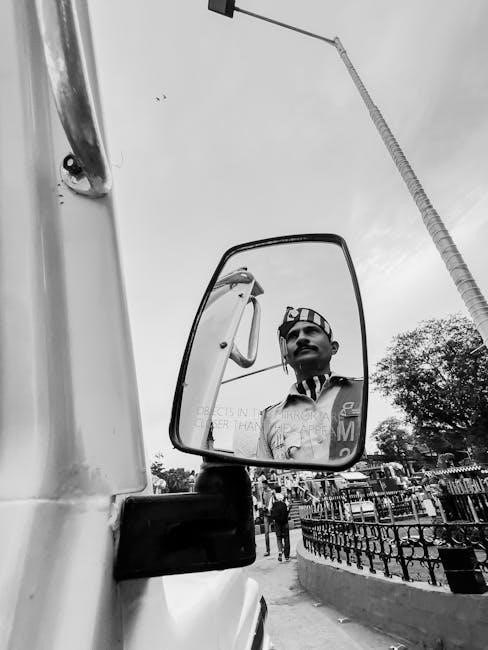
Teamwork and Collaboration
Security guards collaborate with other personnel, supporting staff and coordinating efforts to maintain security protocols. Teamwork ensures effective communication and response, enhancing overall safety and operational efficiency.
7.1 Working with Other Security Personnel
Security guards collaborate with fellow officers, sharing responsibilities and communicating effectively. They coordinate patrols, monitor surveillance, and respond to incidents together, ensuring mutual support and comprehensive security coverage across all areas.
7.2 Collaborating with Law Enforcement
Security guards work closely with law enforcement, assisting in incidents and providing critical information. They ensure compliance with legal procedures, support investigations, and maintain open communication to enhance public safety and security efforts effectively.
7.3 Supporting Facility Staff
Security guards assist facility staff by addressing safety concerns, managing access, and providing emergency support. They ensure smooth operations, maintain order, and offer assistance, fostering a secure and efficient work environment for all personnel and visitors.
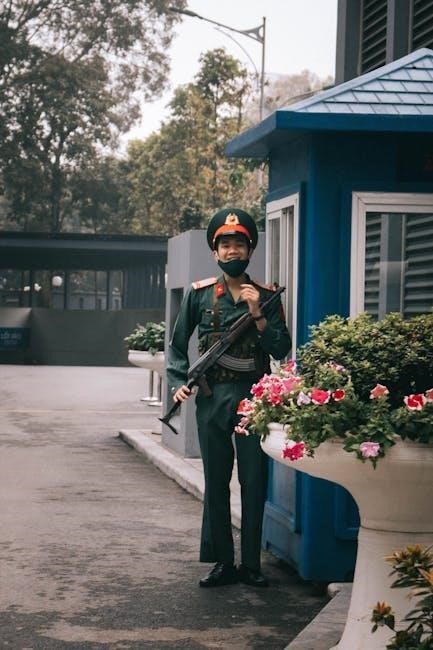
Clerical and Administrative Tasks
Security guards manage records, files, and perform routine clerical duties. They document safety hazards, maintain logs, and support administrative processes to ensure efficient security operations.
8.1 Managing Records and Files
Security guards manage records and files, ensuring accurate documentation of incidents, patrols, and access logs. They maintain organized systems for easy retrieval, supporting transparency and accountability in all security operations.
8.2 Performing Routine Clerical Duties
Security guards handle routine clerical tasks, such as preparing reports, managing schedules, and processing documents. These duties ensure efficient operations and maintain accurate records, supporting the overall security management and administrative needs of the organization.
Organizational Responsibilities
Security guards must report to supervisors, adhere to company policies, and maintain records. They ensure compliance with procedures, supporting organizational goals and maintaining operational efficiency and accountability.
9.1 Reporting to Supervisors
Security guards must provide regular updates to supervisors, detailing incidents, patrol activities, and compliance with procedures. Accurate reporting ensures transparency, accountability, and effective decision-making, aligning with organizational objectives and maintaining trust within the team and management structure.
9.2 Adhering to Company Policies
Security guards must strictly follow company policies, ensuring all actions align with organizational standards and legal requirements. This includes adhering to protocols for patrols, access control, and emergency responses, maintaining professionalism, and upholding ethical conduct to protect the company’s assets and reputation effectively.
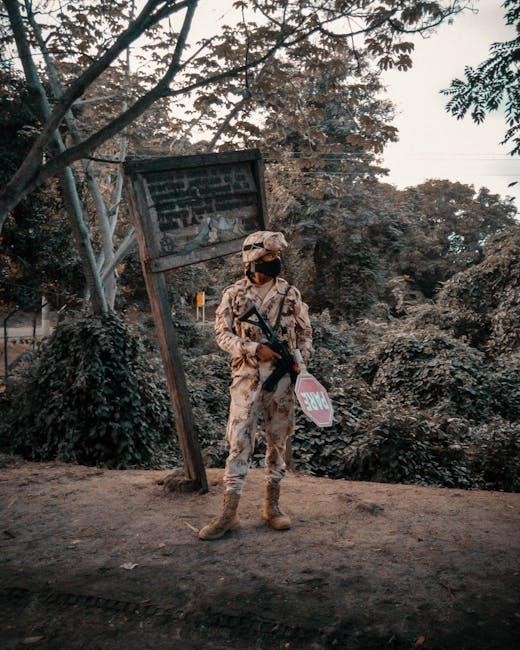
Specialized Roles and Duties
Specialized security roles include night guards and high-security facility personnel, each requiring unique skills to handle specific risks effectively and ensure safety in diverse operational environments.
10.1 Night Guard Responsibilities
Night guards monitor premises during off-hours, ensuring heightened vigilance. They patrol areas, check for unauthorized access, handle alarms, and maintain security logs. Their role is critical for preventing theft and vandalism under cover of darkness, ensuring safety and asset protection around the clock.
10.2 Duties in High-Security Facilities
In high-security environments, guards implement strict access controls, monitor advanced surveillance systems, and respond rapidly to breaches. They conduct thorough screenings and enforce rigorous protocols to protect sensitive assets, maintaining a high level of alertness and professionalism to ensure maximum security and operational integrity.
Legal and Compliance Responsibilities
Security guards must understand their legal authority and limitations, ensuring compliance with local laws and regulations to maintain order and protect rights effectively while upholding organizational policies.
11.1 Understanding Authority and Limitations
Security guards must understand their legal authority and limitations, ensuring they act within the bounds of their training and jurisdiction. This prevents overstepping powers and maintains public trust while enforcing security protocols effectively and ethically.
11.2 Adhering to Local Laws and Regulations
Security guards must comply with local laws and regulations, ensuring all actions are lawful. This includes understanding specific legal requirements and protocols, maintaining proper documentation, and collaborating with law enforcement to uphold legal standards while performing their duties.
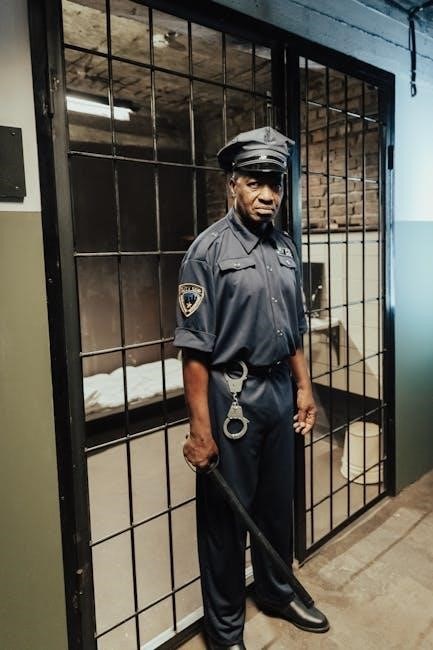
Human Rights and Ethical Considerations
Security guards must respect human rights during all actions, ensuring ethical conduct in arrests, detentions, and searches to maintain dignity and legality in their responsibilities.
12.1 Respecting Human Rights During Security Actions
Security guards must uphold human rights during all security actions, avoiding excessive force and ensuring lawful detentions. They must respect individuals’ dignity, adhering to ethical standards and legal protocols to prevent abuse of authority and maintain public trust in their professional conduct.
12.2 Ethical Conduct in Arrests and Detentions
Security guards must conduct arrests and detentions ethically, ensuring compliance with legal standards. They should minimize force, respect privacy, and avoid discrimination, acting impartially to maintain justice and uphold the rights of all individuals involved in such situations, fostering a fair and lawful security environment.
Security guards are vital for ensuring safety and security. Their duties, from patrolling to emergency response, are essential for protecting people and assets, fostering trust and stability.
13.1 Summary of Key Duties and Responsibilities
Security guards are responsible for patrolling premises, monitoring surveillance, and ensuring safety protocols. They manage access, respond to emergencies, and document incidents. Their roles also include teamwork, adhering to legal standards, and maintaining ethical conduct, all of which are crucial for effective security management and ensuring a secure environment for everyone.
13.2 The Impact of Effective Security Guard Services
Effective security guard services significantly enhance safety, deter crime, and provide peace of mind. They protect assets, ensure compliance with regulations, and support emergency responses, ultimately contributing to a secure and stable environment that fosters productivity and trust within organizations and communities.
